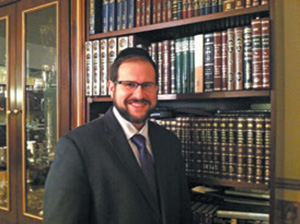
The Beipanjiang Bridge, suspended 1,854 feet above the Nizhu river in southwest China, is currently the highest bridge in the world. The $150 million crossing links the provinces of Yunnan and Guizhou, and has cut travel time by about three hours.
Those of us who live in Rockland or Westchester County are very familiar with news about bridges, watching the continuing construction of the new Tappan Zee Bridge above the Hudson River. The bridge is set to be completed in 2018, costing an estimated $4.5 billion. A thousand steel pipes have been installed into the river to support the foundation of the bridges, and there are hundreds of workers involved in the massive construction project. It is an incredible feat of human engineering.
Why are bridges so important? Because they allow us to connect two otherwise disparate and disconnected components. In sophisticated lexicon, we can say that a bridge allows us to traverse an otherwise impassable terrain. In layman’s terms, we would say that a bridge painlessly allows us to get from one side to the other. It’s about connection; bridging a gap.
During this past May, on the Shabbos of Parshat Emor, the Biala Rebbe of Bnei Brak visited our community. As he didn’t visit our shul I didn’t think I would have the chance to meet him personally. But as I was walking up the hill to shul, I saw three people walking ahead of me, and realized that the middle one was the Biala Rebbe.
This was shortly after we were informed that the twins Chani was carrying had a condition called TTTS (Twin to Twin Transfusion Syndrome), which was a serious concern. Since the rebbe was literally right in front of me, I thought it would be foolish not to introduce myself and solicit his bracha.
The rebbe was very gracious, and when he heard about the twins’ condition he suggested that we be particular to eat Melave Malka every Motzei Shabbos, which should include a hot food or beverage made specifically in honor of Melave Malka. He then blessed us that the birth be incredibly easy “beyond nature” (“l’ma’ala min hateva” doesn’t translate well into English).
Every observant Jew does his utmost to maintain the holiness and sanctity of Shabbos as the holy crescendo of our week. When Shabbos ends, however, we often feel itchy to “get out.” After being “bottled up” in the lofty world of Shabbos for 25 hours, there is often a mentality that we just need to “do something.”
Rabbi Yisroel Reisman is not only a tremendous talmid chacham and rosh yeshiva, but is also renowned for giving one of the most popular shiurim in the world today. His Motzei Shabbos Navi shiur is viewed (via satellite hookup) by thousands of people each week. What a beautiful way to start the new week! Rav Avrohom Pam, zt”l, once praised Rabbi Reisman (his talmid) for “transforming Saturday night into Motzei Shabbos.”
Motzei Shabbos is the spiritual bridge between Shabbos Kodesh and the rest of the week. In the hours after the departure of Shabbos one can quickly lose all the inspiration he absorbed throughout Shabbos. But one who can maintain the spark of Shabbos and infuse it into the new week will have a far more elevated and spiritually connected week.
Since the rebbe gave us that suggestion, Chani and I try to be particular to eat Melave Malka together each Motzei Shabbos. Aside for the great spiritual benefit and honor of Shabbos, spending a few minutes together previewing the following day and week has been very beneficial.
Throughout the months of Chani’s pregnancy with the twins, each doctor’s appointment—sometimes twice a week—was unnerving and highly anxiety-provoking. We davened with great intensity, gave tzedaka every week, solicited brachot and davened at kevarim of grandparents and tzadikim. Hashem blessed us with two beautiful healthy twin boys, who had their brisim on time(!). We would like to believe that all our efforts helped contribute to their healthy birth, baruch Hashem. Undoubtedly also, the merit of eating Melave Malka, and thereby displaying honor for Shabbos by seeking to imbue the coming week with the sanctity of Shabbos, helped as well. It is apparently no trivial matter.
The task of bridging the gap from Shabbos to the rest of the week in a certain way mirrors the task of a Jew’s entire life—to bridge the gap between heaven and earth.
May Hashem continue to shower us with His blessings and give us the ability to raise all of our children to faithfully serve Him and His holy nation by bridging heaven and earth.
By Rabbi Dani Staum
Rabbi Dani Staum, LMSW is the rabbi of Kehillat New Hempstead as well as guidance counselor and seventh-grade rebbe in ASHAR, principal at Mesivta Ohr Naftoli of New Windsor and a division head at Camp Dora Golding. He also presents parenting classes based on the acclaimed Love and Logic methods. His email address is: stamtorah@gmail.com. His website is: www.stamtorah.info.











